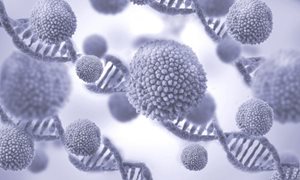
For 20 years, Nijmegen-based Xenikos, a Radboudumc spin-off, has been working on a drug that can reset the immune system. It is now make or break for their drug T-Guard.
The biopharmaceutical company Xenikos based in the Dutch city of Nijmegen has been working on a drug that can reset the immune system and thus save the lives of seriously ill patients. After twenty years of work, the moment of truth for T-Guard has finally arrived.
The long road from a ‘chance’ discovery to the development of a drug against a very rare but life-threatening disease reads like an exciting book. And the final chapter is now upon us. It’s make-or-break time for T-Guard. In the coming month, a concluding study into the medication will start at the Radboud University Medical Center (Radboudumc) in Nijmegen.
Bone marrow transplant
T-Guard is aimed at combating severe rejection in patients who have had a bone marrow transplant. In a transplant with blood stem cells, there is a risk that the donor T-cells (certain types of immune cells) will identify the recipient as ‘foreign’ and start attacking it. This is called graft-versus-host disease (GVHD). About half of all patients who receive a bone marrow transplant develop some degree of GVHD. Every year, approximately 7,000 to 8,000 patients worldwide develop such a severe form of this disease, which the standard treatment with (high doses of) steroids is not able to combat well enough. Many patients with this type of severe rejection end up dying.
Clearing T-cells
The search for a cure has been going on for decades. Today’s drugs are not effective enough. “Our drug quickly and effectively clears adult T-cells that are responsible for the rejection,” explains Ypke van Oosterhout, discoverer of the drug and founder of Xenikos. ” Which basically means that you can safely reset the immune system, so to speak.”
Perserverance
Medical Biologist Van Oosterhout discovered the drug back in 1995. After successfully completing tests in the lab, he wanted to bring the drug into clinics. This was the beginning of a long road that cost a lot of money and was very time-consuming. A tremendous amount of effort for a drug that ultimately can only be used on a small group of patients. “It’s really a matter of perseverance,” says van Oosterhout. “And a never-ending search for financial resources.”
Highly promising
The pilot study that initially started in 1997 showed that the drug was highly promising. Van Oosterhout: “Then the moment arrives that you're standing at the patient's bedside and they receive your medication. I was overwhelmed when I saw a patient face to face for the first time. Of the first seven patients to be administered our drug in a study, one patient survived who would otherwise certainly have died. In four other patients, T-Guard did halt the GVHD, but the damage done at that time was already irreversible. These results boosted my motivation immensely.”
Continuity
Since 2012, Xenikos has been financially supported by OostNL, the Gelderland Innovation and Investment Fund, and Sanquin Bloedvoorziening (a Dutch blood donor agency). “That makes a huge difference. It ensures continuity,” says van Oosterhout. But to be able to do more research, finding more financiers was still necessary. In 2018, an important next step could be taken, with a clinical study conducted in the United States. “The FDA believed in our drug and we were given the opportunity to set up a study with 47 patients, which was expected to be enough to demonstrate efficacy.”
Dramatic turn of events
A hopeful moment, but with a dramatic turn of events: the first three patients who received the drug died. “The study was terminated immediately; it was awful,” recounts Van Oosterhout. After extensive research, it turned out that the patients, all in very poor health, had died not because of the drug but because of their disease. Van Oosterhout: “That is the disadvantage of our drug. These are very sick patients who can die from additional complications of the disease. That this sometimes happens with T-Guard does not mean that it is the fault of the medication.”
New study
After Xenikos was able to prove this, they were allowed to start a new study. At the moment, this new study, in which 250 patients in Europe and the United States will participate, is almost underway. The first patient is going to be treated at the Radboudumc in Nijmegen. A Spanish pharmaceutical company will produce T-Guard. The cost of financing all this: a whopping €40 million. This was provided in part by Veloxis Pharmaceuticals, an American pharmaceutical company that is also developing its own anti-rejection drugs.
Make it or break it
Van Oosterhout can definitely feel the pressure mounting. What if things go wrong again during the study? “It’s make it or break it. If this study doesn’t show what we are anticipating, then this is were it stops.” It will probably take one to two years before all the required patients are included in the study and the final conclusions can be drawn.
The bar is set high. “If T-Guard does not prove to work better than the existing alternatives, then we will not apply to have it registered,” says van Oosterhout. If the drug proves to work well, Xenikos expects to apply for approval in 2024. “We will then have an instrument in our hands that can also be used for other diseases, such as the rejection of donor organs, or for certain autoimmune diseases. Potentially, we are holding something really wonderful. Then Xenikos will become a breeding ground for even more medications.”
See Innovation Origins
-
Want to know more about these subjects? Click on the buttons below for more news.
Related news items

Micro-Cosmos helps patient unwind during hospitalization
10 February 2022 Nijmegen-based Micro-Cosmos is a start-up that makes retractable hoods to speed up the recovery of hospitalized patients. go to page
LUMO Labs and Oost NL invest in Aiosyn Investment accelerates development of artificial intelligence platform to improve diagnostics
7 February 2022 Aiosyn, a spin-off from Radboudumc, has received an investment from LUMO Labs. Oost NL is a co-investor. go to page
Improved AI will boost cancer research and cancer care Geert Litjens receives ERC Starting Grant
13 January 2022 Geert Litjens from Radboud university medical center has received a European Research Council (ERC) Starting Grant. go to page
Understanding fluctuation variation in cognitive abilities may provide insight into lifelong learning Rogier Kievit recieves ERC Starting Grant
13 January 2022 Rogier Kievit from Radboud university medical center has received a European Research Council (ERC) Starting Grant. go to page
Dutch-Nordic Alliance for Precision Cancer Medicine launched
26 November 2021 The Nordic countries (Denmark, Sweden, Norway, and Finland) are together setting up national clinical precision cancer trials modelled on the very successful DRUP trial in the Netherlands. go to page
